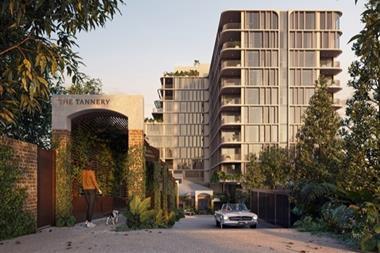GLOBAL – Chinese insurers are being given tacit encouragement by their regulator to invest in foreign real estate, according to the founder of Gaw Capital Partners.
Goodwin Gaw told the AFIRE annual membership meeting in San Francisco that Beijing was "sending a message" to other financial institutions by having allowed Ping An Insurance to acquire the Lloyd's building in London earlier this year.
Gaw, whose company carried out what was Ping An's first-ever overseas real estate investment, said the high-profile, £260m (€310m) deal prompted other institutions to explore global real estate investments.
He said: "This was a landmark transaction, and since then we have had a lot of enquiries [from] a lot of other insurance companies, or other financial institutions [about] how to deploy capital overseas since Ping An showed them the way."
Chinese insurers were given the regulatory green light to invest in "non-self-use" real estate in late-2012, but Ping An still had secure regulatory approval for the Lloyd's acquisition.
According to Gaw, Ping An and Gaw Capital spoke to the regulator together and were able to "get the political buy-in from Beijing" because the iconic building provided a "stable yield" and was the historic headquarters of a famous insurance company.
"It ticks many boxes," he said.
Gaw also said it was an example of the regulator "sending an underneath-the-surface message" that it would support insurers investing in foreign real estate as part of wider overseas investments.
He cited Beijing's ambitions to make the renminbi more of an "international currency" as the motivation.
Government efforts to curtail price inflation in Chinese real estate markets was another reason insurers would be compelled to look to foreign, rather than domestic, real estate, he said.
Speaking from the audience, Dietrich Heidtmann, global head of investor relations and capital markets at Axa Real Estate, questioned whether it was realistic to expect a "wall of capital" from Chinese insurers if they had to seek regulatory approval for property deals.
Gaw responded that the regulator "did pay more attention" in the case of the Lloyd's deal because it was a "landmark transaction".
He also said the regulator was clear that insurers did not need to obtain approval.
But Gaw said insurers would probably go to the regulator for its "blessing".
Appetite for core real estate among Korean institutional investors, meanwhile, was beginning to lessen, according to Gaw and fellow speaker Kevin Crummy, managing director at Eastdil Secured.
Yield compression over the past two years has prompted them to look at value-add and junior debt strategies, delegates were told.
"They started earlier than the Chinese, so they are coming from a different perspective," Gaw said.
"You are going to see more Korean investors looking to come into mezzanine or preferred equity positions, where they do perceive that to be a safe place to put their capital."
Crummy, whose company specialises in property investment banking, said value-add strategies would be a "tougher proposition" for Korean investors because of their income-return requirements.
"There are some institutions that will do that and others that [will not] feel comfortable with it," he said.
"So the mezzanine and preferred-equity piece is a lot easier."
The 25th annual membership meeting of the AFIRE, the Association of Foreign Investors in Real Estate, attracted 260 delegates.












